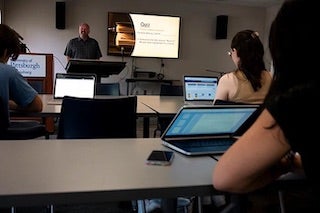 Educators and stakeholders in undergraduate education will gather at the University of Pittsburgh at Greensburg on Saturday, May 18, for a Teaching Summit to explore innovative approaches to bolstering undergraduate student identity and retention. This free hybrid event will open at 8:30 a.m. and run through 2 p.m.
Educators and stakeholders in undergraduate education will gather at the University of Pittsburgh at Greensburg on Saturday, May 18, for a Teaching Summit to explore innovative approaches to bolstering undergraduate student identity and retention. This free hybrid event will open at 8:30 a.m. and run through 2 p.m.
The summit will delve into critical topics essential for student success—from enhancing student identity to fostering inclusive teaching practices and the impact of mentorship—providing a platform for educators to share insights and best practices. Cosponsored by the U.S. National Science Foundation Scholarships in Science, Technology, Engineering, and Mathematics (NSF S-STEM; grant No. 2130102) and the Allegheny Branch of the American Society of Microbiology (ABASM), this inaugural summit promises a dynamic agenda featuring a panel discussion, interactive breakout sessions, and a 'lunch and learn' networking opportunity.
Olivia Long, PhD, associate professor of biochemistry who is currently on detail at the NSF, will moderate a panel discussion highlighting Science Cornerstone. This innovative course has significantly increased STEM retention among first-year and transfer students. Science Cornerstone and biology instructors Barbara Barnhart and Jennifer Ingram will participate on the panel, along with alumni from Pitt-Greensburg’s Science Learning Community Program that was funded by a previous NSF S-STEM grant (No. 1458289).
“The panel discussion will offer valuable insights into effective strategies for student retention in STEM,” explained Long. “By highlighting these initiatives, we aim to inspire educators and stakeholders to adopt innovative approaches that cultivate student identity and foster a supportive learning environment, ultimately contributing to the long-term success of STEM students.”
Other Pitt-Greensburg faculty will lead interactive sessions focusing on facets of student identity and retention. These include strategies for professional identity formation, creating inclusive learning environments, effective mentorship practices, and survey design methodologies tailored to explore student identity.
"This summit is a testament to our commitment to advancing STEM education and supporting the success of our students," said Jordan Boothe, PhD, assistant professor of biochemistry and current principal investigator of the S-STEM Program at Pitt-Greensburg. “This summit allows us to share what has been successful for us, as well as, engage with fellow educators to enhance our practices.”
“We are proud to cosponsor this teaching summit,” added Sarah Swerdlow, PhD, assistant professor of biology and president-elect of ABASM. “ABASM faculty have a strong interest in undergraduate teaching and STEM inclusivity. This summit will allow faculty the opportunity for meaningful dialogue, collaboration, and actionable solutions to challenges that will ultimately enhance student identity and retention in STEM disciplines."
While the Teaching Summit will use focused examples from STEM disciplines, the summit is open to educators and stakeholders in any discipline who are interested in enhancing student identity and retention. Registration, which is required for planning purposes, is free and open to the public.